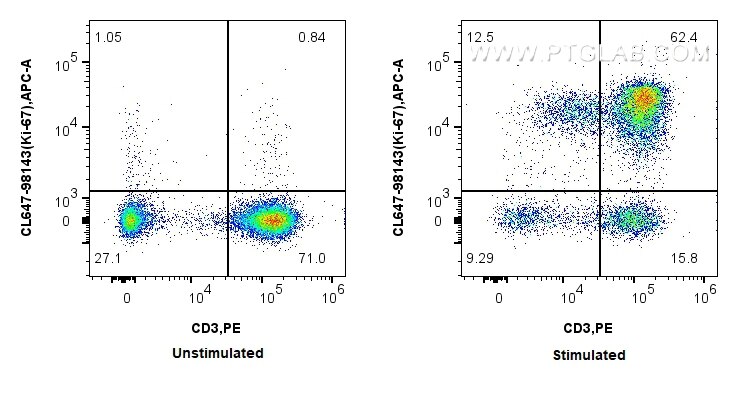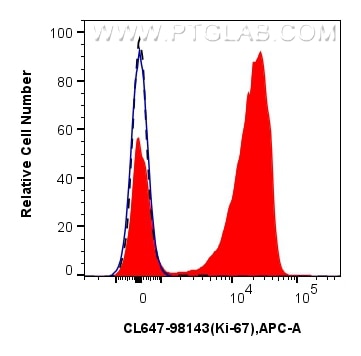Tested Applications
| Positive FC (Intra) detected in | PHA treated human PBMCs |
Recommended dilution
| Application | Dilution |
|---|---|
| Flow Cytometry (FC) (INTRA) | FC (INTRA) : 5 ul per 10^6 cells in a 100 µl suspension |
| This reagent has been pre-titrated and tested for flow cytometric analysis. The suggested use of this reagent is 5 ul per 10^6 cells in a 100 µl suspension or 5 ul per 100 µl of whole blood. | |
| Sample-dependent, Check data in validation data gallery. | |
Product Information
CL647-98143 targets Ki-67 in FC (Intra) applications and shows reactivity with human samples.
| Tested Reactivity | human |
| Host / Isotype | Rabbit / IgG |
| Class | Recombinant |
| Type | Antibody |
| Immunogen |
Peptide Predict reactive species |
| Full Name | antigen identified by monoclonal antibody Ki-67 |
| Calculated Molecular Weight | 359 kDa |
| GenBank Accession Number | NM_002417 |
| Gene Symbol | KI67 |
| Gene ID (NCBI) | 4288 |
| Conjugate | CoraLite® Plus 647 Fluorescent Dye |
| Excitation/Emission Maxima Wavelengths | 654 nm / 674 nm |
| Form | Liquid |
| Purification Method | Protein A purification |
| UNIPROT ID | P46013 |
| Storage Buffer | PBS with 0.09% sodium azide and 0.5% BSA, pH 7.3. |
| Storage Conditions | Store at 2-8°C. Avoid exposure to light. Stable for one year after shipment. |
Background Information
The Ki-67 protein (also known as MKI67) is a cellular marker for proliferation. Ki67 is present during all active phases of the cell cycle (G1, S, G2 and M), but is absent in resting cells (G0). Cellular content of Ki-67 protein markedly increases during cell progression through S phase of the cell cycle. Therefore, the nuclear expression of Ki67 can be evaluated to assess tumor proliferation by immunohistochemistry. It has been demonstrated to be of prognostic value in breast cancer. In head and neck cancer, several studies have reported an association between high proliferative activity and poorer prognosis.
Protocols
| Product Specific Protocols | |
|---|---|
| FC protocol for CL Plus 647 Ki-67 antibody CL647-98143 | Download protocol |
| Standard Protocols | |
|---|---|
| Click here to view our Standard Protocols |






